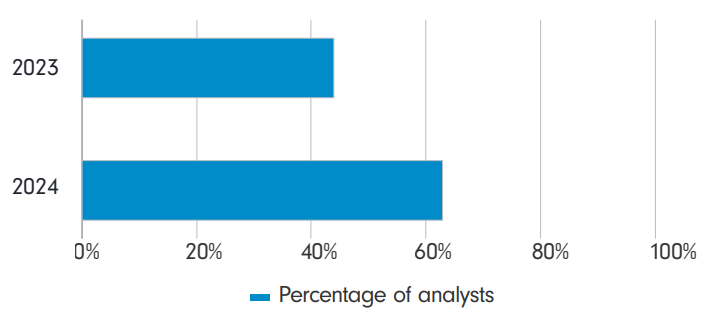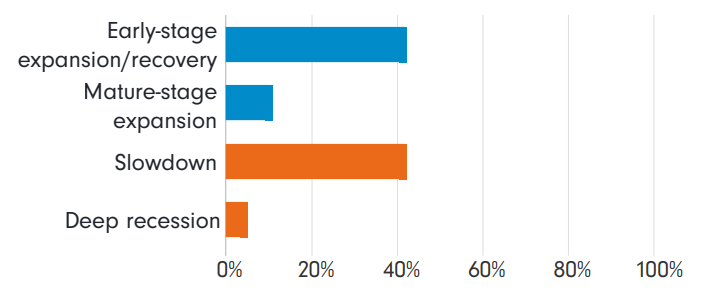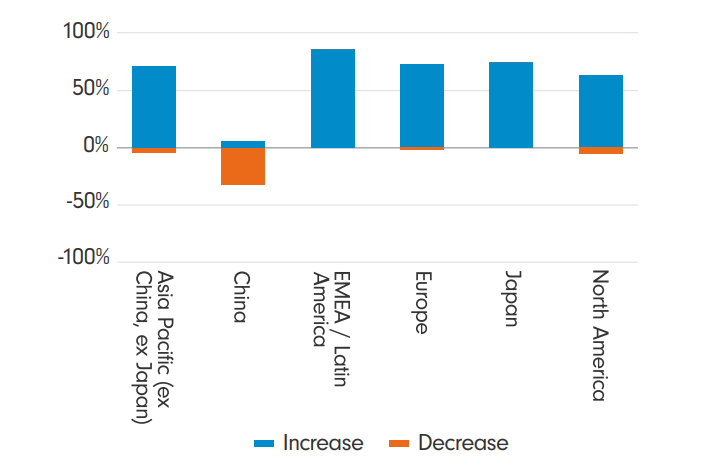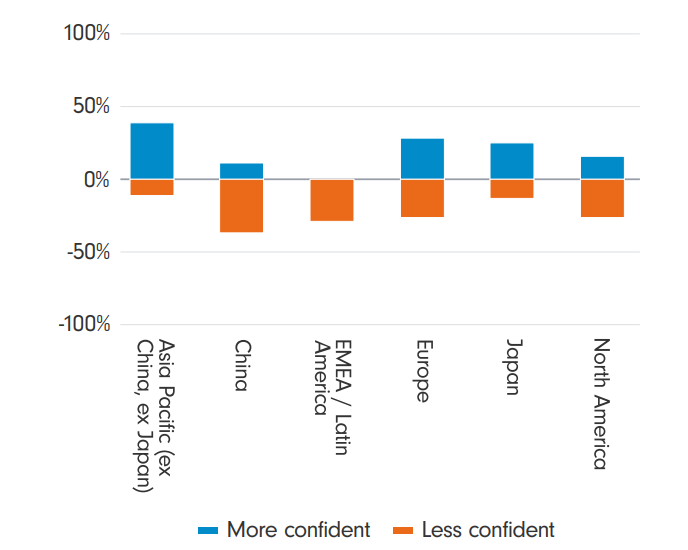Economic stimulus, low borrowing costs, and a loose labour market are proving supportive to most Chinese companies - for now. But sluggish demand is dampening management sentiment for 2024.
China’s much-hailed reopening in early 2023 after three years of lockdown, did not generate the economic rebound many had hoped for (including us). But the disappointing performance was at least in part cushioned by policymakers’ moves since July to ramp up stimulus intended to stabilise the property sector and defuse local government debt risks.
“The Chinese recovery is happening, but it is quite fragile,” says Peter Carter, an equity analyst covering Chinese financial firms. “My base case is that the recovery will continue gradually for Chinese insurers and fintech lenders in 2024, whilst other financial subsectors will continue to face headwinds.’’
Consumption has become the country’s engine of growth since restrictions were lifted, accounting for 83 per cent of real GDP growth in the first three quarters of last year1. Monetary easing and increased government spending on infrastructure have also boosted growth. About two thirds (63 per cent) of Fidelity’s China analysts say the Chinese companies they cover are currently in an expansion stage of the business cycle, up from 44 per cent a year ago2.
More China analysts say their sector is now in expansion

Chart shows responses to the question: 'What stage of the cycle is your sector currently in?' Chart shows percentage of analysts who answered either 'early-stage expansion', 'mid-stage expansion', or 'mature-stage expansion.'
“Growth is expected to slow down, and interest rates will trend lower in China.”
But the prolonged property slowdown continues to weigh heavily on consumer confidence, since real estate accounts for a large proportion of household wealth in China.
“The priority from the top leadership is to stabilise the economic slowdown with a focus on high-quality growth instead of debt-fuelled growth,” says real estate fixed income analyst Ming Gong. “I expect China to continue its structural slowdown.”
Against this backdrop, analysts are cautious about the performance of their companies in the coming 12 months and their answers suggest a slight slowdown. Just over half of our China analysts say their companies will be in some form of expansion stage by the end of 2024.
China analysts are cautious on the future

Chart shows responses to the question: 'What stage of the cycle will your sector be in, in 12 months' time?' Each bar represents the number of analysts choosing the specific stage of the cycle.
This figure is slightly lower than the percentage of analysts who say their companies are in an expansion stage now, implying a slowdown.
Although analysts do forecast an increase in Chinese companies’ revenues and profit margins in 2024, expectations are weak when compared to the rest of Asia.
Economic weakness pushes down costs
China stands out as the only region in this year’s survey where more analysts expect labour costs to decrease than increase over the next six months. Labour demand remains sluggish, with more weakness in the market for younger and less experienced workers. This is a political hot potato but eases pressure on company management teams.
China’s loose labour market and falling wages

Chart shows responses to the question: 'For total labour costs, what are your expectations for your companies over the next six months compared with current levels?' Analysts who responded 'No change' are not shown on the chart. Chart shows percentage of analysts.
It is also one of only two regions - the other being EMEA/Latin America - where more analysts anticipate non-labour costs to drop rather than go up.
The absence of inflation - a contrast to the experience of most countries after they reopened their economies - is helping Chinese companies to reduce costs. But it also reflects weak growth momentum, which could outweigh the benefit of falling costs.
“Automobile companies are having to cut new car prices as competition intensifies and consumer sentiment stays weak,” says Eric Tse, an equity analyst covering Chinese auto companies.
Easing set to continue
The loose monetary environment was a boost for Chinese companies in 2023. First-time bond defaults in the onshore market fell sharply. Low borrowing costs are likely to have helped companies service their debt and default risks are expected to stay low as the PBoC unveils more easing measures in 2024.
“Growth is expected to slow down, and interest rates will trend lower in China,” says Sherry Zhang, a fixed income analyst covering the financial sector.
But our analysts expect more differentiation in funding costs between state-owned and private-owned property developers. “Refinancing will not be a challenge for state-owned property developers, and interest costs may go down as China continues in its loosening monetary cycle,” says Fiona Shou, an equity analyst covering property firms. “However, for private-owned developers that have not defaulted, refinancing may become harder and interest costs may go up if contracted sales do not improve.”
CEOs turn conservative
The country’s muted economic outlook is making business leaders cautious. China is the region with the highest proportion of analysts who describe their companies’ management teams as being less confident about investing in their business over the next 12 months compared to last year.
Management confidence in China is fragile

Chart shows responses to the question: 'How would you describe the confidence level of your companies' management teams to invest in their businesses over the next 12 months, compared to the previous 12 months?' Analysts who responded 'No change' are not shown on the chart. Chart shows percentrage of analysts.
Most analysts still say chief executives expect earnings to grow, but the percentage has dropped from 81 per cent to 58 per cent in the past year.
Eric Zhu, a consumer discretionary analyst says: “Management teams are still not confident about policy support and macro demand in 2024.”
With slowing demand at home, many Chinese companies are looking beyond their own borders for growth. Leading firms in the automobile, machinery, and consumer sectors are venturing abroad, building factories or sales offices in the US, Europe, or Africa.
“Demand for electric vehicles and energy storage systems is slowing down,” says auto analyst Eric Tse. “Companies aren't willing to invest in expansion for the domestic market, but they are active in investing in production facilities and sales channels abroad.”
China’s outlook may not be as bright as it was when the economy reopened a year ago. But further stimulus and a gradual adjustment by Chinese companies to a new economic backdrop should provide a year of stabilisation after a turbulent 2023.
Sources
1 According to the National Bureau of Statistics of China
2 Fidelity International’s Analyst Survey was conducted in December 2023
